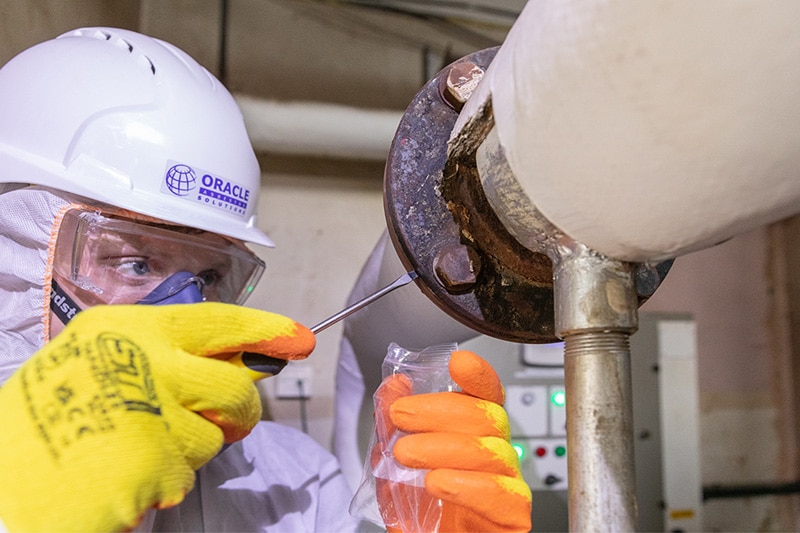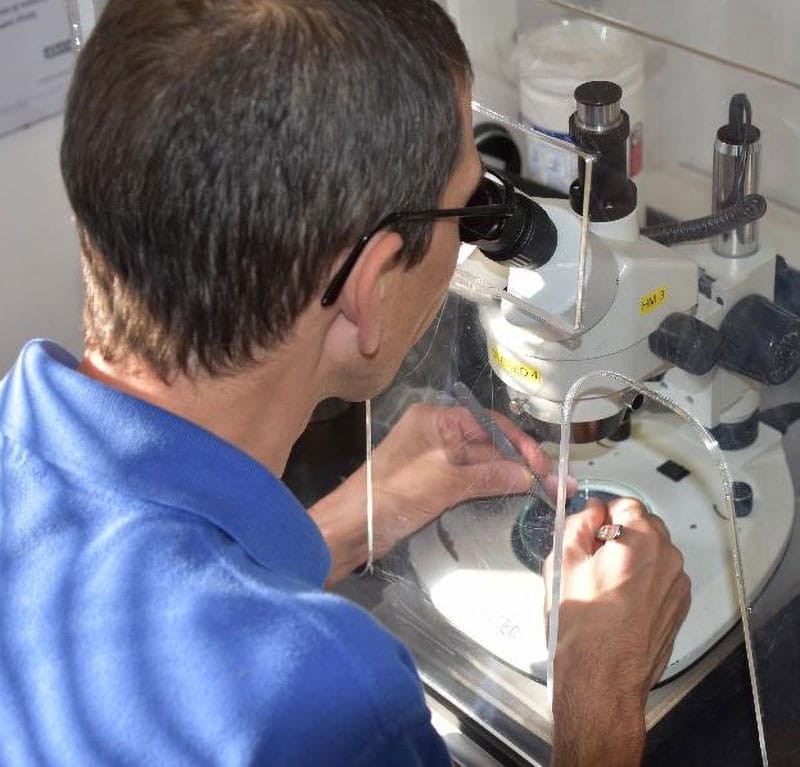Asbestos sampling kits: what do I need to know?
Given that asbestos is a notorious carcinogen that has not been legal to use in the UK since 1999, it is understandable that you may be concerned about the risk of this fibrous silicate mineral being present in a property for which you are responsible.
You might be aware that during the substance’s period of legal use between the mid-19th century – when it was first commercially mined – and the 1999 ban, asbestos was incorporated into thousands of products. These asbestos-containing materials (commonly referred to as “ACMs”) encompassed the likes of asbestos cement roof sheets, asbestos insulating board (AIB), asbestos vinyl floor tiles, asbestos gaskets, and many other products.
Such was the extensive use of asbestos during the bulk of the 20th century, if you are responsible for a domestic, commercial, or public building that was constructed or renovated prior to the year 2000, there will be a strong likelihood of it containing asbestos.
But if you notice a particular product or material in your property that you suspect to be asbestos, and you wish to determine whether it does contain the now-outlawed mineral, would using an asbestos sampling kit be the best decision?
Asbestos sampling kits – also often called “asbestos testing kits” – have been the subject of a broad range of views over the years. So, in this article, we’ll outline the key things that you should know about them before you decide whether to use such a kit.

What are asbestos sampling kits and how do they work?
An asbestos sampling kit is designed to enable someone to take an asbestos sample themselves, so that they can then send the sample to a laboratory for analysis. As anyone who performs a Google search for “asbestos sampling kits” will quickly discover, they are available to purchase online from various sources.
There isn’t any standardised list of items that asbestos testing kits “must” include – so, the exact contents will vary from kit to kit. As a general rule, though, asbestos sampling kits tend to consist of the following:
- Safety glasses
- A disposable face mask, which should be at least FFP3 rated
- Disposable coveralls (category 5/6)
- Disposable gloves
- Sample bags and packaging
- Cleaning wipes
There is a range of circumstances in which an individual or organisation might consider purchasing an asbestos sampling kit. Someone may be intending to carry out DIY work in their residential property, for instance, and they might be anxious about possibly disturbing older materials in the building that may or may not be asbestos. By having these suspect materials tested, they could take the first steps to managing them safely.
Alternatively, you might be operating in a commercial capacity; you may be a builder, plumber, or roofer who is about to commence a new job at a given property, only for questions about potential ACMs in the building to have been raised.
In theory, asbestos sampling kits could be useful for such people as those cited above, confirming whether a particular product in a building is or isn’t asbestos. However, as we shall cover elsewhere in this article, they might not be an ideal solution for everyone, or for every situation.
Is it safe to use an asbestos sampling kit myself?
This isn’t always the most straightforward question to answer, particularly given the very wide range of asbestos-containing products that exist, and the varying levels of risk they can pose.
After all, while some ACMs may only consist of around 5% of asbestos and are well-bonded, meaning they present a relatively low risk – asbestos Bakelite being one example of such a material – other ACMs may comprise up to 100% asbestos, in addition to being highly friable.
The term “friable” refers to the susceptibility of a material to crumbling if hand pressure is exerted on it. Friable ACMs, then, could pose a high risk of dangerous asbestos fibres being released into the air if disturbance or damage is caused to them.
When you consider these factors alongside the fact that asbestos testing kits don’t typically come with any training other than a basic instruction sheet, you can probably quickly understand how dangerous the use of such a kit could turn out to be. It could be particularly risky to use an asbestos sampling kit from a health and safety perspective if you don’t know how to properly handle the ACMs you are looking to test.
All of this underscores the importance of following essential safety measures when you use an asbestos sampling kit, including wearing personal protective equipment (PPE) and minimising asbestos disturbance. You will need to follow the kit instructions precisely to avoid contamination.
If you aren’t confident in your ability to capture an asbestos sample yourself, or you are unsure of the exact risk that suspected ACMs in your property may pose, you might ultimately decide that contacting professional asbestos surveyors or abatement experts would be the better course of action.
How do I choose the right asbestos sampling kit?
Presuming you do decide to go ahead with seeking out an asbestos testing kit – instead of enquiring about an asbestos survey like the ones Oracle Solutions’ skilled professionals can undertake – you are likely to discover you have a broad range of options.
You might find that some kits are designed for single samples, for example, while others may be meant to hold multiple samples, or specific materials such as tiles or insulation. So, when attempting to choose an asbestos sampling kit, you will need to consider such factors as the type of material or product you are looking to test, as well as the size of the area being tested.
If you can, you should seek out information about the laboratory associated with the kit, including any certifications that it might hold, and its reputation for reliability. It is also a good idea to try to find out details such as how clear the provided instructions are, how easy it is to submit a sample, the typical turnaround time for results, and the quality of the PPE provided.
To give one example of a potential quality issue with the included PPE: too many asbestos testing kits only contain masks rated to FFP2, which isn’t adequate for filtering asbestos fibres, as opposed to the safer FFP3.
The price of the kit, too, will inevitably be a consideration. A typical price range for asbestos sampling kits is from around £25 to as much as £80 or more. The initial price that you see may or may not include the fee for laboratory analysis, so you are advised to double-check this.
Ultimately, of much greater importance than the headline price of a given asbestos sampling kit, will be the all-round value for money it represents – including with regard to accuracy, safety, and convenience – compared to using professional services.
What should I do after collecting the asbestos samples?
Even if you are confident enough to take a sample yourself, and you manage to do so in accordance with your chosen kit’s instructions, your work won’t be done. That’s because you will then need to securely package the sample and send it to the laboratory, while ensuring the package has been properly labelled and all necessary documentation has been completed.
The exact turnaround time for the laboratory results will vary from one kit to the next. The postal service used for sending back the sample will obviously impact on this, so it will be helpful to choose a testing kit that includes prepaid first-class return delivery as part of the price. Hopefully, the sample will be tested on the day it is received by the laboratory. Again, though, you are advised to double-check the situation for the specific kit you choose.
Once the results are ready, you can expect a laboratory report to be issued, setting out whether asbestos was detected. If so, information should be provided on which types of asbestos were found to be present in the sample, and the exact asbestos concentration levels.
If the result of the laboratory test is positive for asbestos, the provider of the kit – presuming you have chosen a reputable one – should be able to help you with interpreting the report, while advising you on the best steps to take next. The kit provider’s assistance at this stage might include putting you in contact with a nearby asbestos removal company.

Courtesy of Asbestos Laboratory Services (UK) Ltd
What are the next steps if asbestos is detected?
Presuming the results back from the laboratory do indicate the tested materials contain asbestos, it is recommended that you immediately take certain actions to help ensure the safety of the location where the sample was taken.
Such actions are likely to include – as we have written about in the past – ceasing any work that may be taking place in the location, and preventing anyone from entering that part of the property, other than the professionals who you may hire to manage and/or remove the ACM. Any potentially affected residents or workers in the building should also be informed.
It is important to emphasise that the mere fact of asbestos being present in a UK property, does not automatically mean it will need to be removed. As we have also covered in a previous article, any decision on whether to remove ACMs from a building will depend on such factors as the condition of the materials, and the likelihood of them being disturbed in the future.
If, for instance, the ACMs are in good condition and are in a part of the site where future disturbance is judged to be unlikely, it might ultimately be better to “encapsulate” them, instead of removing them. Encapsulation is a process whereby ACMs are sealed off to prevent loose (and potentially extremely dangerous) asbestos fibres from escaping.
Certain individuals and organisations have a legal obligation to manage asbestos in buildings for which they are responsible; this “duty to manage” is outlined under Regulation 4 of the Control of Asbestos Regulations 2012 (CAR 2012). You should therefore familiarise yourself with this legislation if asbestos is indeed detected in your property, so that you can keep on the right side of the law when managing ACMs at your site.
What are the limitations of asbestos sampling kits?
Asbestos sampling kits can offer certain advantages as part of a building owner or manager’s broader efforts to manage asbestos at their site – including being relatively inexpensive, and usually providing quick results. However, they can also present major drawbacks.
Those disadvantages include (to cite just a few):
- The quality of these kits can be highly variable. The masks included in them, for example, might not provide sufficient protection against airborne asbestos fibres.
- They can be unreliable in the results they provide, compared to using a professional service. This might not always be due to the quality of the test itself, but instead a consequence of the untrained user being unable to capture an adequate sample.
- The equipment included in the kits isn’t usually very advanced. Fully qualified and competent asbestos surveyors, on the other hand, use specialist equipment to help make sure they take an adequate sample. This, in turn, helps to ensure accurate results from the subsequent laboratory analysis.
- They are not generally suitable for all scenarios. You may, for instance, be intending to have a large-scale renovation carried out at the site for which you are responsible, or the given environment might be a high-risk or otherwise complex one. If this is the case, it will probably be a better idea to seek out professional services instead of a sampling kit.
Asbestos sampling kits can offer benefits, but also have major pitfalls
As we have sought to address in this article, asbestos testing kits can be useful in certain limited circumstances. However, in situations such as impending wider-scale refurbishment or demolition projects, or where the suspected asbestos-containing materials are in poor condition or damaged, it will be a better course of action to seek out professional help. This will be of critical importance for ensuring both safety and compliance when dealing with asbestos.
To learn more about our own licensed and accredited asbestos services at Oracle Solutions, and to request a fast and free quote, please don’t hesitate to contact our team today.

Written by Callum McDonald
Callum McDonald is an expert in asbestos quality management, ensuring rigorous adherence to regulations and high-quality standards in removal projects. His focus on enhancing quality and client satisfaction makes him a crucial asset in safety and compliance within the field. Callum's expertise in technical support and oversight of licensed works underscores his commitment to excellence in asbestos management, providing invaluable guidance to clients in this specialised area.
